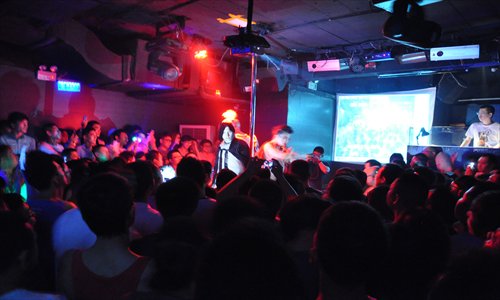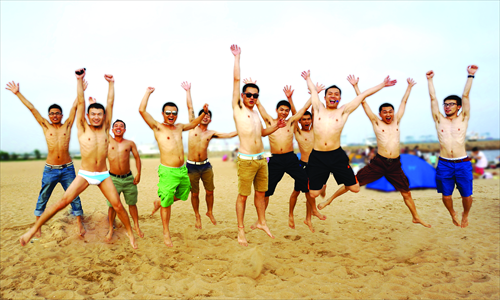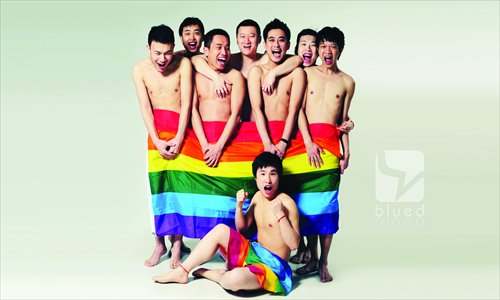
Destination, Beijing's biggest gay nightclub. Photo: Courtesy of danlan.org, Destination


With high disposable incomes and no expenses from raising children, Beijing's gay community is a lucrative consumer market. Photo: Courtesy of danlan.org, Destination
It's a stroke after midnight on Saturday and away from the neon haze of Sanlitun's bar street the party is just warming up at Destination, Beijing's biggest gay nightclub. Located at the west gate of Workers Stadium, the club is the center of the capital's gay nightlife scene. Its dimly lit dance floor reverberates with everything from trendy house to cheesy disco music at night in stark contrast to its upper floors that showcase edgy art exhibitions during the day.
On an average Friday or Saturday night, more than 800 people cram into the four-story nightclub. Most are men aged in their 20s or 30s who aren't shy to spend big on an even bigger night out. After paying the 60 yuan ($9.80) cover charge, most revelers splurge on pricy cocktails or spirits to rehydrate in between sweaty dance sessions.
Destination, like a growing number of bars, shops, gyms and restaurants around the world, is cashing in on so-called pink money from a group of consumers with relatively high disposable incomes: lesbians, gays, bisexuals and transgenders (LGBT).
LGBT people account for up to 10 percent of the global consumer market, according to San Francisco-based research firm Community Marketing & Insights. In Asia alone, the 200 million-strong LGBT consumer market has buying power to the tune of $800 billion annually, the Financial Times reported earlier this month.
There are plenty of advantages for businesses courting gay customers, too. LGBT consumers often show strong loyalty to businesses that cater to them. Combine this with findings from a survey by dating website jiayuan.com last year that more than 80 percent of post-1980s youths in China are opposed to homophobia, there has never been a better time for businesses to woo the LGBT community.
Pink economic revolution
Geng Le, CEO of China's largest gay website danlan.org, said Beijing's emerging pink economy is presenting unprecedented opportunities to business owners.
"It's an extremely promising field. China has around 70 million LGBT people who have consumer demands that differ from heterosexuals. For example, there are no travel agencies catering [exclusively] to gay tourists," said Geng.
Danlan.org is also expanding its reach to LGBT consumers. Earlier this year it raised around 3 million yuan in capital to launch Blued, a gay online dating app that currently boasts more than 1 million users.
Geng, a policeman for 16 years, quit the force last year to devote all his efforts to expanding his business.
"When I came to Beijing in 2009, I found the environment had changed a lot. Fewer people seemed to discriminate against LGBT people. In first-tier cities, a growing number of businesses targeting gay customers have emerged," said Geng.
"As recently as six or seven years ago, this would have been impossible to imagine. Back then gay [social networking] websites were often shut down. Many people thought being gay was abnormal and harmful to social virtues."
Danlan.org was often shut down by Internet authorities after it was launched in 2006. In 2012, it generated 1 million yuan in revenue, 90 percent of which came from advertisers.
Geng also credits his website with helping an advertising client, a Hong Kong underwear label popular among gay men, increase its sales in the Chinese mainland market last year.
"Although they initially targeted gay consumers, now they don't want to be labeled as 'gay' brand," said Geng, who was coy about naming the brand.
Edward Yang, one of five co-founders of Destination, said that he and his partners main motive in opening the nightclub was to provide a platform for gay people to socialize.
Yang, who works full-time as an accountant for a multinational firm, was excited about investing "under 1 million yuan" to become a partner in the business.
"Another reason I set up Destination was that I felt unhappy with my day job. I was sick of office politics and wanted fulfillment," said Yang, a native Hongkonger.
All cashed up
A 2010 survey by danlan.org found that LGBT consumers have three times more buying power than heterosexuals in China. Like consumers from the dual income no kids (DINK) group, many LGBT consumers work in professional fields and aren't burdened by costs of raising children.
"Gay people place a high value on their living standards. They often don't have children or the heavy financial pressures many heterosexuals with families face," Geng said. "Furthermore, a higher proportion of gay people have expensive tastes in fashion and high-end lifestyles compared to heterosexuals."
Although the emergence of Beijing's pink economy is still unfolding, competition among businesses to seize their share of gay consumers' disposable income has intensified since 2010. Once representing the entire local gay nightlife scene, Destination now competes against four other gay bars in Beijing that have opened over the past three years.
"To make matters tougher, our costs are increasing all the time. Our employees' salaries and costs owed to suppliers have increased a lot, but in the past nine years we have only risen our prices once," said Yang.
Many clubbers at Destination are young people, particularly university students or new graduates with entry-level jobs, which Yang said makes it problematic to raise prices too much.
Wei Feng (pseudonym), 31, spends a sizeable portion of his 10,000 yuan monthly salary on buying clothes and socializing. Wei, who works in marketing and is gay, said it is "empowering" to have more businesses vying for his patronage.
"The rise of businesses targeting LGBT people in Beijing is good because it provides me and others like me with greater diversity. I decide where I dine or shop based on the type of other diners or shoppers who go there," said Wei.
Although Beijing currently lacks an openly "gay" restaurant or café per se, Wei said he keeps an eye out for businesses that host LGBT-related activities.
"I really hope businesses can diversify their appeal to gay consumers. For example, if I hang out at a gay bar I want to also enjoy art or have a health check," said Wei, saying such business models can further promote gay rights.
Advertising barriers
Fan Popo, a filmmaker and executive chairman of the Beijing LGBT Center, said tight government controls posed the biggest hurdle in development of local gay culture and commerce.
In 2008, the State Administration of Radio, Film and Television banned all LGBT-related content in the film.
In 2009, the Ministry of Industry and Information Technology ordered Internet filtering software that blocked gay websites to be packaged with every computer sold in China, the Associated Press reports.
"Even now we can't advertise or have any publicity exposure in the mainstream media. Even if we distribute our posters on the subway we face prosecution," said Geng.
Yang said Destination had felt the squeeze of Beijing's growing pink economy last year and it has posted a loss of nearly 1 million yuan. The fledgling sub-economy might still be growing, but its gay nightclub sector has bottomed out, he said.
"The so-called pink economy has always been around. Gay consumers bought the same products they did even before the term was coined. Even if some niche markets [for gays] are being overlooked, it's only a matter of time before they are tapped as society continues accepting that gay people are equal to heterosexuals. But overall social recognition hasn't reached this level just yet," said Yang.
Developing Beijing's gay quarter
Even if nightlife venues have developed at a faster pace than other sectors, Fan believes Beijing's pink economy still has a long way to go. For a city of 20 million people, there is plenty of untapped potential, he said.
"Seoul is home to around 50 gay bars, more than 10 times the number in Beijing," said Fan.
Fan noted that opening a gay bar or nightclub in Beijing is easier than other businesses because the city's nightlife area is concentrated. By comparison, opening a restaurant targeting gay diners is more difficult because Beijing lacks a distinct gay quarter, she said.
"People aren't willing to travel across the city for several hours to dine at a gay restaurant. The location of a gay restaurant must be in the vicinity of a gay community." said Fan.
Which begs the question: where is Beijing's closest thing to a gay quarter?
"So far, Shuangjing has the best potential," said Fan.



